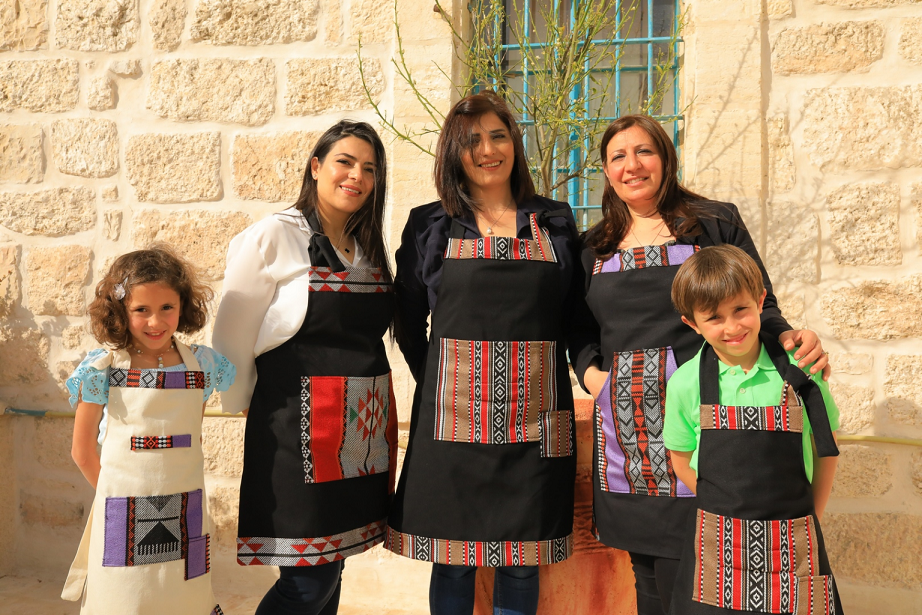Like every Thursday morning, Ghada H., Monika, Ghada S. and Nuha gather around the big table in the Bet-women workshop. Ghada H. takes the lead: “The Christmas line must be ready by the first weeks of November”, she reminds her colleagues and friends.
Ghada S. scribbles a note in her diary and adds: “That would be ideal: so we can take nice pictures and post them on our website and Facebook and start advertising as soon as possible”.
Bet-women do not want to give up. “This enterprise must continue to exist”, says Ghada S., “we want to enter the market and solidify our position. I would like this job to become my future, the future of my family“.
Monika, who is in charge of buying the materials to make bags, aprons, pot holders, rucksacks, clutch bags and so on, empties her day’s booty onto the table: lots of scraps of fabric. These are the samples to choose from to make the new models designed for Christmas.
Now the meeting can begin: it’s time to make choices, plan the work, divide up the tasks and get down to business!
What is Bet-women?
Bet-women is a Pro Terra Sancta’s project that started in March 2020 during the pandemic. Due to the containment measures against the spread of Covid-19, like the long lockdowns and border closures, Bethlehem’s economy, based on religious tourism, collapsed.
“We couldn’t ask anyone for help” says Monika with a sad look on her face, “almost everyone was out of work. Everyone I know was in the same situation. Most of the Bet-women’s husbands were employed in the tourist industry. To date, only two of them have started working again, but in a different sector.
The burden of contributing to the maintenance of their families falls entirely on the shoulders of our girls. Our Association, which supports the local communities of the Holy Land, the living stones that bear witness to the life and works of Jesus, has helped them to bear this burden.
From project to enterprise
During the spring of 2020, a tailoring training and start-up course was set up for a group of women aged between 25 and 45. Two local designers, Yasan and Nadia, taught the girls how to use sewing machines to make masks for free distribution to the charities we support in Bethlehem.
It was a simple but effective way of doing good: the fixed monthly salary given to the participants helped them to cover their expenses during a difficult period and the masks protected frail children and elderly people from contagion.
What started out as a training and health emergency response project quickly became an entrepreneurial idea: an all-female business with a strong cultural identity targeting a local and international market.
First challenges, first successes
When Ghada H. runs her hands over the aprons and bags hanging on the relay in the workshop, her eyes light up: “At first I was afraid I wasn’t good enough“, she says, “I had never used a sewing machine before!”. Hers was a fear of not being good enough but also of not being able to be there for her family.
By bringing the sewing machines home, however, the problem was solved: “we can work from 4 to 6 hours a day. All that matters is that the product is finished by the deadline we set for ourselves,” says Ghada.
But her potential is not limited to sewing. At the age of 40, she got back into the game and took part in a master’s degree programme in human resources management at Bethlehem University.
Women, mothers, entrepreneurs
Ghada S. also went back to school. She is passionate about marketing and communication and manages the Facebook page and the Bet-women website. She also helps Ghada H. with bookkeeping and order reporting. All this with three teenagers at home. “My daughters are so happy with my work,” she says, “I’m teaching them to sew too!”.
Monika strokes her belly: she is expecting her fourth child but doesn’t stop for a moment and continues undaunted to lift boxes and large rolls of fabric. Nuha, the oldest of the group, tries in vain to take a big bag out of her hand.
“These colourful fabrics, with all these geometric patterns, tell our story,” says Nuha as she examines a square of green fabric. Bet-women’s products are an explosion of colour on sober black, cream, green and red backgrounds: the colours of Palestine.
Every apron, every bag, every cushion has something special about it: it speaks of a cultural identity that still has to be properly valued. All the girls agree: they want to grow and succeed. They want to become independent and continue to expand. “We want to make our products known in Bethlehem and in the world“, they tell us, “we want to explain to people who the Bet-women are. We want to continue to be Bet-women!“






